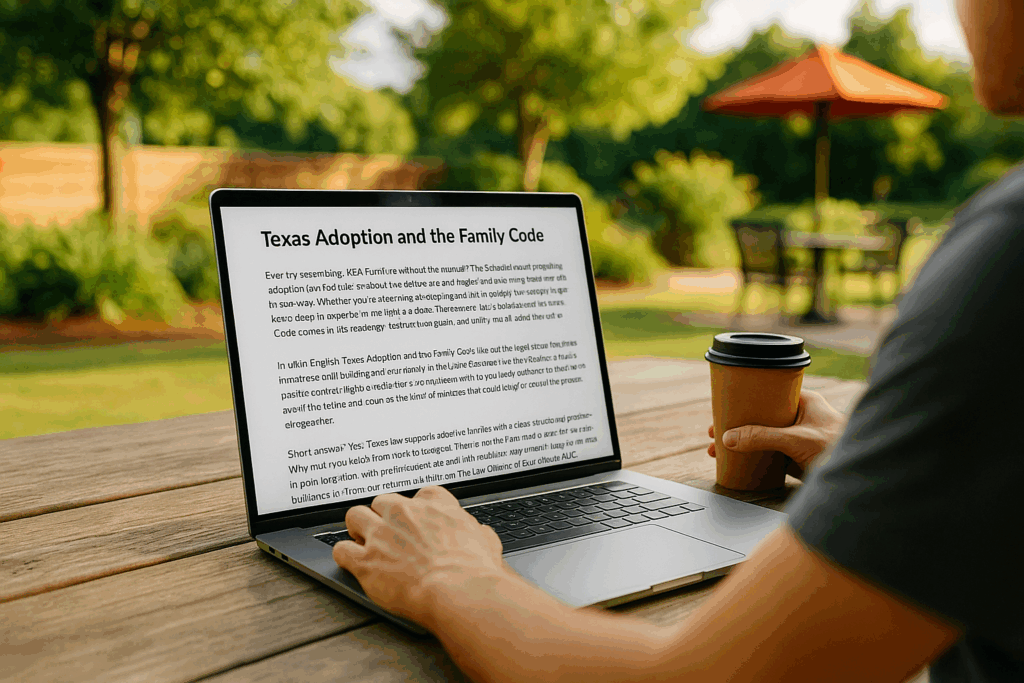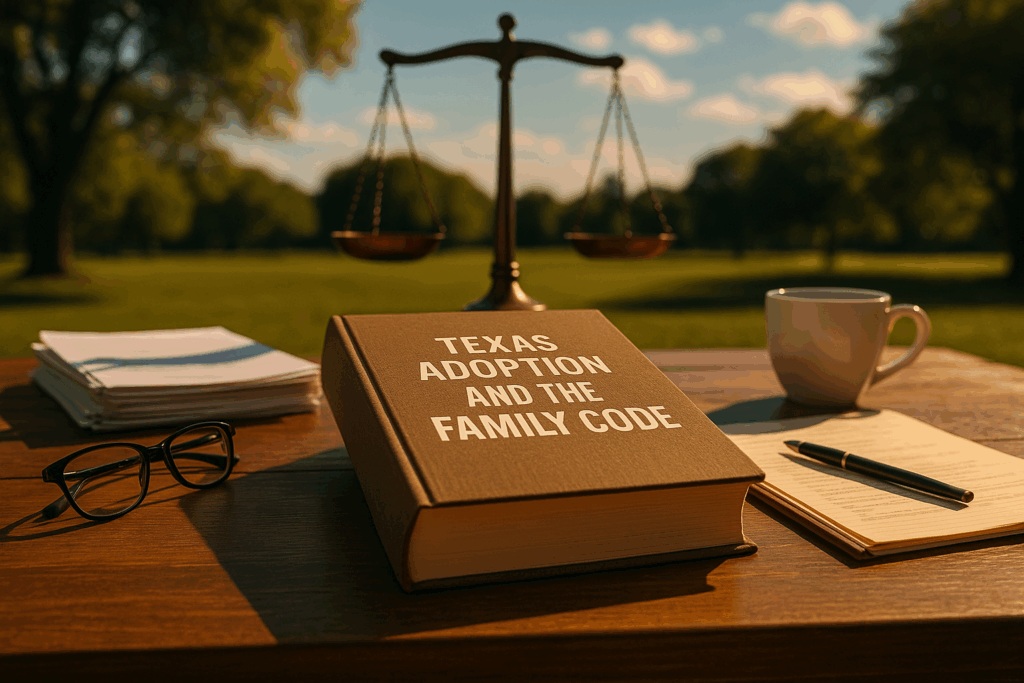
Ever try assembling IKEA furniture without the manual? That’s kind of what navigating adoption law feels like—except the stakes are way higher, and there’s no tiny Allen wrench to save you. Whether you’re dreaming of adopting a child or already knee-deep in paperwork, the legal process can feel like a maze. That’s where Texas Adoption and the Family Code comes in—it’s the roadmap, instruction guide, and safety net all rolled into one.
In plain English, Texas Adoption and the Family Code lays out the legal steps, timelines, and must-haves for building a forever family in the Lone Star State. From home studies and court hearings to post-adoption rights and subsidies, it covers everything you need to know to do adoption the right way—and avoid the kind of mistakes that could delay or derail the process altogether.
Short answer? Yes, Texas law supports adoptive families with a clear, structured process—but only if you know how to navigate it. That’s why this blog exists: to give you the inside scoop, in plain language, with plenty of real-life examples, legal insight, and guidance from our team here at The Law Office of Bryan Fagan, PLLC.
Stick with us and you’ll learn how to cut through the legal jargon, avoid the common pitfalls, and move forward with confidence. Plus, we’ll show you how adoption ties into educational stability, emotional well-being, and long-term success—especially if divorce, custody, or special needs are part of your story. So grab your coffee (or your legal pad), and let’s get into it.
Key Takeaways: Texas Family Code Adoption Essentials
- The Texas Family Code, particularly Chapter 162, is essential for defining the legal framework of adoption, outlining eligibility, consent requirements, and prioritizing the child’s best interests throughout the process.
- Termination of parental rights, governed by Texas Family Code § 161.001, is a critical step that requires clear evidence and can proceed without consent from absent or unfit parents, ensuring the child is freed for adoption.
- Engaging a licensed adoption attorney is crucial for navigating the complexities of Texas adoption laws, ensuring compliance, timely submission of documents, and effective representation during legal proceedings.

Your Adoption Journey Starts Here
Don’t navigate the adoption process alone. Schedule a consultation today and receive the expert guidance and support you need to build the family of your dreams.
Understanding Texas Family Code Chapter 162
At the heart of every successful adoption in Texas is Texas Adoption and the Family Code—specifically Chapter 162. This chapter serves as the legal blueprint for adoptive families, covering everything from who can adopt to how and when consent must be obtained. It ensures that every adoption prioritizes the child’s best interest and prohibits decisions based on race, ethnicity, or other discriminatory factors.
Chapter 162 outlines key components such as eligibility criteria, home study requirements, and consent from relevant parties. For example, Texas Family Code § 162.010 explains when a child must legally consent to their adoption—typically at age 12 or older. If you’re wondering how this works in real life, we’ve broken it down in our blog on when a child must consent to a Texas adoption.
Texas courts are legally bound to place the child’s well-being at the center of every adoption ruling. Judges look for evidence that the adoptive family can provide a stable, nurturing, and safe environment—not just on paper, but in practice. This holistic approach is why the law also considers the role of biological relatives, such as grandparents, in maintaining emotional continuity post-adoption.
Understanding the framework of Chapter 162 can help adoptive families avoid common pitfalls and navigate the process with greater confidence. If you’re exploring related family law issues, like custody or parenting plans, our article on the best interest of the child in Texas custody cases is another valuable resource.
At The Law Office of Bryan Fagan, PLLC, we don’t just guide you through the legal steps—we help you build a future. Whether you’re pursuing private, stepparent, or agency adoption, our team is here to provide compassionate, experienced support every step of the way. Let’s make sure your adoption journey is grounded in clarity, care, and the confidence of knowing your rights are protected.

Termination of Parental Rights (Texas Family Code § 161.001)
One of the most critical steps in the adoption process is the termination of parental rights, governed by Texas Family Code § 161.001. This step is necessary to free a child for adoption, ensuring that the adoptive parents can assume full legal responsibility for the child’s care and well-being. The court requires clear and convincing evidence to terminate these rights, always prioritizing the child’s best interests.
Termination can occur under several conditions, including:
- A one parent of the child fails to support the child or has voluntarily left the child without intending to return.
- A child’s parent engages in conduct that endangers the child’s physical or emotional well-being.
- A parent causes the child to be born addicted to drugs or alcohol.
In cases filed by the Department of Family and Protective Services, the district court finds that reasonable efforts were made to reunite the child with the parent before proceeding with termination.
Legal representation plays a crucial role in these situations. An attorney specializing in adoption can guide you through the complexities of terminating parental rights and obtaining the necessary consents. Key points include:
- The court can waive the requirement for consent from biological parents if they are absent, unfit, or uncooperative.
- This waiver is particularly relevant when a biological father has been absent for an extended period.
- In such cases, the mother’s consent alone may suffice for the adoption to proceed.
Prospective adoptive parents should understand the intricacies of termination proceedings. This preparation ensures they can navigate any challenges that arise and effectively handle the legal landscape. The ultimate goal is to serve the child’s best interests, providing them with a stable and loving home.
Eligibility and Consent Requirements (Texas Family Code § 162.010–162.012)
Eligibility and consent are foundational elements of the adoption process, as outlined in Texas Family Code § 162.010–162.012. Adopting in Texas requires meeting specific conditions regarding parental rights. Married petitioners must both join in the original petition, ensuring joint responsibility.
Written consent from the managing conservator is typically required, although this can be waived by the court under certain circumstances. Generally, a valid adoption requires consent from both biological parents, any legal guardians, and the child if they are 12 years or older. However, the court can override the need for a child’s consent if it’s in the child’s best interest.
Involving the child in the decision is crucial, especially for older children who are more aware of their circumstances. Their consent is a significant part of the process, and a refusal can delay the adoption. Legal guardians must also provide consent, particularly when the biological parents’ rights have been terminated or if the child has been in their care for a long period.
Obtaining clear and valid consent is vital to proceed with the adoption smoothly. It ensures that all parties are in agreement and that the child’s transition into their new family is as seamless as possible. Knowing these requirements helps prospective adoptive parents navigate the legal landscape confidently and clearly, including the need for further consent.
Home Study and Pre-Adoptive Evaluation (Texas Family Code § 162.003)
As any experienced adoption attorney will tell you, a successful adoption in Texas depends heavily on the home study and pre-adoptive evaluation. These steps, required under Texas Family Code § 162.003, serve as the legal system’s way of ensuring that every child is placed in a safe, stable, and emotionally supportive environment. The process isn’t just about checking boxes—it’s about confirming that a prospective adoptive family is truly ready for the journey ahead.
Under Texas Adoption and the Family Code, the home study includes in-depth interviews with everyone living in the home, background checks for household members aged 14 and up, and an assessment of the family’s emotional preparedness. Investigators will examine your motivation for adopting, your parenting experience, and your ability to provide consistent care for a child—particularly one coming from a challenging background.
A critical part of this process is the written report. This document includes summaries of interviews, home safety evaluations, and an overall recommendation to the court on whether the family meets the criteria for adoption approval. Alongside this, families must also prepare a health, social, educational, and genetic history report for the child, which becomes a vital part of the adoption file. Adoptive parents are entitled to receive this report to better understand the child’s needs and background.
Another important aspect to keep in mind: in most cases, the child must live with the adoptive family for at least six months before the court will finalize the adoption. This pre-placement period helps ensure the child is adjusting well and that the home is a good long-term fit. However, this residency requirement can be waived by the court if it’s determined that skipping it would be in the child’s best interest.
Understanding the timeline and responsibilities of the home study process is essential. For those beginning the adoption journey, we recommend reviewing our post on consent to adoption forms in Texas to better understand how legal documentation fits into the broader picture. And if you’re exploring other critical legal considerations, our guide to filing for custody in the correct Texas county is another helpful resource. At The Law Office of Bryan Fagan, PLLC, we’re committed to helping families navigate these complex steps with confidence and care—because every child deserves a future built on stability and love.

Adoption of Stepchildren and Kinship Placements (Texas Family Code § 162.025 and § 162.026)
In Texas, stepparent and kinship adoptions offer a meaningful way to provide children with legal stability while preserving family bonds—and Texas Adoption and the Family Code provides the legal framework for making that happen. Under Texas Family Code §§ 162.025 and 162.026, a stepparent can adopt their spouse’s child more easily if the other biological parent has already had their rights terminated or voluntarily relinquished them. This simplifies the process, but when the noncustodial parent is still involved, their rights must be legally addressed before the adoption can be finalized.
If the noncustodial parent does not voluntarily consent, their rights must be terminated by court order based on grounds set forth in Texas Family Code § 161.001, such as abandonment, unfitness, or failure to support the child. The court will only proceed with a stepparent adoption if it determines that doing so is in the child’s best interest. For prospective parents navigating this process, understanding who must give legal consent is essential—our article on who must provide consent to a Texas adoption provides a helpful breakdown.
Kinship adoptions—where grandparents, aunts, uncles, or other relatives seek to adopt—are often favored by Texas courts because they preserve a child’s emotional and familial continuity. However, they are not exempt from the legal safeguards required in all adoptions. These relatives must still complete a home study, secure the necessary consents, and demonstrate their ability to provide a safe and supportive environment. In both stepparent and kinship cases, the law prioritizes the child’s long-term well-being over any other factor.
Whether you’re a stepparent ready to take that next step or a relative stepping in to care for a child, the adoption process can feel overwhelming without the right guidance. At The Law Office of Bryan Fagan, PLLC, we help families navigate these deeply personal legal matters with clarity and care. If you’re considering adoption and want to better understand the challenges and opportunities ahead, check out our related post on how contested adoptions unfold in Texas. We’re here to help you turn legal complexity into a pathway for family and stability.

Final Decree of Adoption (Texas Family Code § 162.016)
The final decree of adoption is the culmination of the adoption process, as outlined in Texas Family Code § 162.016. This critical stage involves a court hearing where all relevant parties, including the child if they are 12 years or older, must be present. The court issues the final decree of adoption only if it determines that the adoption is in the child’s best interest and all legal requirements have been satisfied.
During this hearing, the court may also address requests to change the child’s name, which will be reflected in the court order. This name change is an important part of the child’s integration into their new family. The final decree of adoption legally confirms the adoption, granting the adoptive parents full parental rights and responsibilities.
This stage is a momentous occasion for adoptive families, marking the official beginning of their new life together. It is the final step in a long and often challenging journey, but it signifies the start of a new chapter filled with hope and possibility. Knowing what to expect during the final decree of adoption helps prospective adoptive parents prepare for this significant milestone.
Rights of Adopted Children (Texas Family Code § 162.017)
Adopted children have specific legal rights, as outlined in Texas Family Code § 162.017. An adoption order establishes a legal parent-child relationship between the adoptive parent and the child, granting all associated rights and privileges. This legal relationship ensures that adopted children have the same inheritance rights as biological children from their adoptive parents.
Once they reach adulthood, adopted children are entitled to access their adoption records, providing them with important information about their background and history. This access is crucial for many adoptees, as it allows them to understand their origins and, in some cases, reconnect with their biological families.
Terms such as ‘child,’ ‘descendant,’ and ‘issue’ in legal documents encompass adopted children unless explicitly stated otherwise. This inclusion ensures that adopted children are treated equally under the law, reinforcing their status as full members of their adoptive families and acknowledging each child’s rights.
Knowing these rights helps adoptive parents support their children throughout their lives, ensuring they access all the benefits and protections the law affords. It also empowers adopted children to fully embrace their identity and heritage.
Practical Advice for Prospective Adoptive Parents
Preparing for adoption involves more than heartfelt intentions—it requires detailed organization and compliance with legal documentation requirements under Texas Adoption and the Family Code. According to Texas Family Code Chapter 162, prospective adoptive parents must submit a comprehensive set of documents to demonstrate their fitness to adopt and to satisfy court standards. Creating a checklist and staying ahead of deadlines can help reduce unnecessary delays and ensure the process moves forward smoothly.
In most cases, the law requires that the child live with the adoptive petitioner for at least six months before finalization, unless the court finds it’s in the child’s best interest to waive that requirement. Married couples must file a joint petition, and all adults in the home must undergo background checks and fingerprinting to verify the safety of the living environment. These safeguards are not meant to be intimidating—they’re in place to ensure each child is entering a secure and nurturing household.
Financial stability and health preparedness are also key elements of the adoption evaluation. Courts often request recent tax returns, pay stubs, and proof of stable housing—such as lease agreements or mortgage statements. Health records, including vaccination histories, may also be required to show that the adoptive parents are physically capable of caring for a child. A full breakdown of these materials is outlined in our guide on essential Texas adoption required documentation.
Misconceptions about the process—like needing a spotless home or a perfect record—often create unnecessary anxiety. In reality, the goal is not perfection, but preparation. Our attorneys are here to help families understand the true expectations and avoid the stress of second-guessing what’s needed. For more insight on related legal steps, visit our resource on filing for custody in the correct Texas county. At The Law Office of Bryan Fagan, PLLC, we’re committed to helping families prepare thoroughly, act confidently, and stay focused on what truly matters—building a loving and lasting home for a child.

Real-Life Scenarios: How the Texas Family Code Applies
Knowing the real-life applications of the Texas Family Code is crucial for prospective adoptive parents. Many families have faced challenges during the adoption process, such as disputes over parental rights or delays due to uncooperative biological parents. A knowledgeable attorney can help navigate these issues to ensure the adoption proceeds smoothly.
For example, consider a case where a biological father contests an adoption after years of absence. The court will prioritize the child’s best interests, especially if the father has not maintained a relationship with the child. Another scenario might involve a stepparent adoption where the non-custodial biological parent must relinquish their rights voluntarily or have them terminated by the court. These real-life examples highlight the importance of understanding the legal steps and working with an experienced attorney.
The Texas Family Code provides a clear legal framework that helps resolve disputes and ensures that the adoption process is fair and transparent. By understanding how the code applies in various scenarios, adoptive families can better prepare for potential challenges and work towards a successful adoption outcome.
Testimonials from families who navigated these challenges with the help of the Law Office of Bryan Fagan, PLLC, illustrate the positive impact of expert legal support and adoption assistance. These stories serve as a source of inspiration and reassurance for prospective adoptive parents facing similar situations.
Testimonials: Success Stories from the Law Office of Bryan Fagan, PLLC
The Law Office of Bryan Fagan, PLLC is dedicated to guiding families through the complexities of adoption, ensuring that every client feels supported throughout their journey. Families often share their gratitude for the comprehensive support and expertise provided by the firm, showcasing successful adoptions achieved through their assistance.
One family recounted how the Law Office of Bryan Fagan helped them navigate the termination of parental rights for a biological father who had been absent for years. The attorney’s expertise ensured that the adoption was completed smoothly, and the child could finally join their forever family.
Another testimonial highlighted the firm’s role in a contested stepparent adoption. Despite initial resistance from the non-custodial parent, the attorneys successfully demonstrated that the adoption was in the child’s best interest, leading to a positive outcome.
These case stories illustrate the significant role that the Law Office of Bryan Fagan, PLLC plays in transforming the lives of families by facilitating successful adoption case adoptions.
In conclusion, the testimonials affirm the dedication and skill of the Law Office of Bryan Fagan, PLLC in helping families navigate the adoption process and achieve their dreams of expanding their families.
Working with a Licensed Adoption Attorney
Navigating adoption in Texas isn’t just emotional—it’s highly legal, and that’s where working with a licensed adoption attorney becomes essential. Under Texas Adoption and the Family Code, particularly Chapter 162, every step of the adoption journey must comply with specific statutory requirements. From filing the right documents to addressing contested parental rights, legal missteps can delay or even derail an adoption. An experienced attorney ensures those pitfalls are avoided—keeping your focus where it belongs: on your growing family.
A qualified Texas adoption lawyer will help ensure every form is completed accurately and filed on time, including consents, background checks, and home study documentation. This legal support becomes even more critical when an adoption involves complexities like stepparent rights, disputed parental involvement, or cases where a biological parent won’t consent. For families in this situation, our team often recommends reviewing stepchild adoption in Texas and what to do if the other parent won’t consent to understand available legal options.
The courtroom aspect of adoption—especially during contested cases or termination of parental rights under Texas Family Code § 161.001—can be intimidating without legal representation. A seasoned attorney serves not just as a legal advisor but as your advocate during hearings, helping you present your case clearly and compellingly. This is particularly important in ensuring the court sees how the adoption supports the child’s best interest, which remains the ultimate standard under Texas law.
Whether you’re adopting a stepchild, a relative, or through an agency, having the right attorney by your side gives you the confidence and clarity you need. For additional insight on the legal hurdles in adoption and custody, visit our blog on how contested adoptions unfold in Texas. At The Law Office of Bryan Fagan, PLLC, we’re proud to offer families more than legal services—we offer peace of mind, rooted in experience and driven by your family’s future.

Conclusion:
Parenting doesn’t come with a playbook—but when it comes to adoption and family law in Texas, thankfully, there is a code. And while it may not read like a bedtime story, Texas Adoption and the Family Code offers the structure, protection, and legal clarity needed to build a stable future for your family. Whether you’re navigating custody after divorce or preparing to welcome a new child through adoption, knowing your rights (and your child’s) is one of the best gifts you can give your family.
At The Law Office of Bryan Fagan, PLLC, we believe in demystifying the legal process—because the law should serve people, not confuse them. If today’s article helped shine a light on something that once felt overwhelming, we’re glad you’re here. And if you’re standing at the starting line of an adoption journey or rethinking your custody plan to better support your child’s academic and emotional well-being, we’re ready to walk beside you.
Curious about how your unique situation fits into the Family Code puzzle? Let’s talk. Our consultations are free, our advice is personalized, and our mission is always the same: to educate families and protect futures.
And if you’re still holding that metaphorical Allen wrench wondering which piece goes where—don’t worry. We’ve assembled plenty of these blueprints before.
Texas Adoption and the Family Code – Frequently Asked Questions
The family code for adoption in Texas is primarily found in Chapter 162 of the Texas Family Code. This chapter outlines the procedures, rights, and responsibilities involved in both private and public agency adoptions, including home studies, termination of parental rights, and the finalization process.
In Texas, adoptive parents must be at least 21 years old, financially stable, and pass a home study and background checks. Consent from the child (if over 12), biological parents, or conservator is typically required, unless waived by the court. The child must generally live with the adoptive family for at least six months before finalization.
Texas Family Code § 107.153 outlines the qualifications and duties of an attorney ad litem for a child. This code mandates that the attorney ad litem represent the child’s expressed interests in legal proceedings, including providing guidance and legal advocacy in custody and adoption cases.
Texas Family Code § 156.002 defines who has standing to file a suit for the modification of a court order regarding conservatorship, possession, or access. This includes parents, conservators, and certain relatives, among others.
In many cases, yes—but only if the biological father’s parental rights have been terminated or the court finds that consent is not legally required. This typically involves proving abandonment, neglect, or other statutory grounds for termination under Texas Family Code § 161.001.
Adoptive parents in Texas may qualify for state and federal benefits including monthly adoption subsidies, Medicaid coverage for the child, reimbursement for non-recurring adoption expenses, and federal adoption tax credits—especially in special needs or foster care adoptions.
The ‘3-3-3 rule’ is a general guideline used by adoptive parents to understand a child’s adjustment timeline: it may take 3 days to decompress, 3 weeks to settle into routine, and 3 months to begin to feel at home. It’s not legal doctrine but a helpful rule of thumb in post-adoption parenting.
Disqualifications may include a history of child abuse, neglect, certain criminal convictions, unstable housing, or failing a home study. Texas requires background checks for all household members 14 and older. Each case is reviewed individually with focus on the child’s best interests.
No. Once an adoption is finalized in Texas, the biological parent’s rights are permanently terminated and cannot be reinstated. The adoptive parents assume full legal and parental rights, and the adoption decree is considered final and binding.
Bryan Fagan is a Texas family law attorney with a heart for adoption—inspired not just by his legal career, but by his own family story. Growing up in Atascocita with two adopted brothers, Bryan learned early the profound meaning of chosen family. His passion for justice was sparked by John Grisham’s The Pelican Brief, and he became the first lawyer in his family, balancing night classes at South Texas College of Law while caring for his grandmother with Alzheimer’s.
Today, Bryan brings that same dedication to his practice, guiding families through adoptions, custody disputes, divorces, and complex marital agreements. A certified member of the College of the State Bar of Texas, he combines elite legal expertise with genuine empathy—drawing from his roles as a husband, father of three, and advocate for families facing false CPS allegations.
Based in Houston, Bryan is actively involved in the Houston Bar Association’s Family Law Sector and statewide family law organizations. Whether finalizing an adoption or protecting parental rights, he believes the law should reflect the deepest values of home, commitment, and love.

